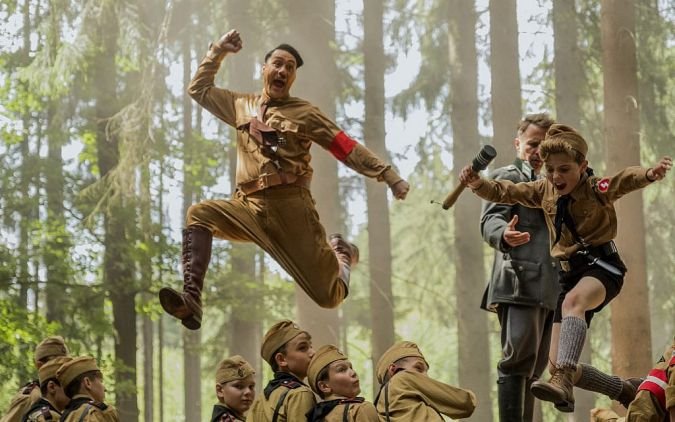When Taika Waititi first announced that he’d play an imaginary version of Adolf Hitler in a sort of coming of age film, there was some trepidation. The screenplay was on the Black List of the best-unproduced scripts. Presumably, after Waititi achieved massive success with Thor: Ragnarok, turning around one of Marvel’s less well-received franchises for the better, Disney figured that the man could do no wrong. Yes, 20th Century Fox, now owned by Disney, produced a film in which a young boy speaks to his imaginary friend, Adolf Hitler.
In addition to playing the fantasy version of the fuhrer, Waititi produced, wrote, and directed the film, based on Caging Skies by Christine Leunens. So, the question is, was Waititi the man for the job? Absolutely. While Jojo Rabbit is just shy of “perfection,” Waititi handles the content with elegance, humor, and a whole lot of heart.
The film focuses on Jojo (newcomer Roman Griffin Davis), a young boy growing up in Nazi Germany. Without a father figure in his life, Jojo speaks to his imaginary paternal friend, Adolf Hitler (Taika Waititi). Not knowing exactly what the real Hitler acts like, Jojo imagines him through an amalgamation of German propaganda and how he believes a good friend should be.
Jojo joins a Hitler Youth Camp, and struggling to fit in, he pulls a risky stunt in the hopes of becoming respected which instead lands him back home with his mother (Scarlett Johansson). Exploring the house one day while his mother is at work, Jojo discovers Elsa (Thomasin McKenzie), a Jewish girl hiding in the crawlspace. Confronted with the fact that his mother has protected the very kind of person he’s taught to hate, Jojo interacts with Elsa, forcing him to examine his fervent nationalism.

So is Jojo Rabbit a satirical comedy or a wartime drama? Within the first ten seconds of the film, much of the audience, including myself, started laughing. Towards the end, the laughs became replaced by tears. Jojo Rabbit doesn’t contain non-stop comedy, but the laughs it does provide are big ones. Along with Waititi, Rebel Wilson and Stephen Merchant were the two actors who were allowed to improvise. Good chunks of the movie don’t feature them, but whenever they do crop up it’s almost always to provide some solid comedy.
The film starts off with a jovial, lighthearted tone, but as it goes on that tone gradually becomes dourer. After a certain emotional scene, the film allows itself to stay in that mood for a while before going back to comedy. A wise move. Waititi knows when to allow the audience to breathe and when to present comedic or solemnly serious moments. Its best scenes are the ones that provoke both laughter and thought. The film begins with a montage of shots from Triumph of the Will, the ultimate Nazi propaganda film, set to a German cover of “I Want to Hold Your Hand” by The Beatles. The segments provide humor but also highlights how people can get caught up in widespread cultural movements for better or in this case, for worse.
The whole cast is top-notch, with Davis and McKenzie anchoring the film. A young cast can often make or break a film, so for a movie that spends more time with them than I would’ve thought, the two deserve heaps of credit. Davis has the task of generating humor throughout the film, and he does so without ever acting twee or cutesy like many children in comedic tend to do. McKenzie shines as Elsa, who uses confidence and charm to mask her underlying fears. Even at her most aggressive, there’s always a slight tell that conveys the knowledge that she could have to face death at any moment.
The rest of the cast plays to their strengths admirably as well. As Jojo’s mother, Scarlett Johansson adds sincerity to a role that could otherwise seem overly fanciful. As mentioned before, Rebel Wilson and Stephen Merchant provide a lot of laughs in two of the more villainous roles. Sam Rockwell plays a disillusioned German captain, a smaller yet strangely complex role that benefits from having a heavyweight actor. Interestingly, Waititi’s Hitler proves one of the weaker links, which only shows how strong the rest of the cast is.

Perhaps Waititi knows this, as Imaginary Adolf only shows up now and again when needed to provide a look into Jojo’s inner psyche. As a director, Waititi flourishes. He has a finger on the pulse of the film’s tone and gracefully navigates through comedy, tragedy, and everything in between. The cinematography by Mihai Malaimare Jr. is top-notch, as he researched restored photos of the setting in color in preparation.
The small-town Germany of the film isn’t one of austere browns and grays, but rather one with an expressive color palette. Aside from being more closer to reality, the color palette also highlights how the world looks through the eyes of our imaginative child protagonist. Much of the film takes place in Jojo’s house, understandable since Elsa can’t leave, so it’s a testament to the production team that the house itself has much character, with each room having a different hue and theme to it.
Jojo Rabbit successfully balances irreverent humor alongside poignant dramatic moments, and most importantly, does so with heart. Waititi knows the difference between punching up and punching down. Yes, there are bits that would seem harsh taken out of context, but they are always provided with so much thought and care surrounding them that they consistently hit their mark. All of the characters, even the wackier ones, feel like real people, albeit real people placed in ridiculous times and circumstances. It’s here that the film showcases the absurdity of blind idealism and prevalent hatred, providing an especially relevant and timely message.
Jojo Rabbit isn’t out to provide the be-all-end-all satirical take-down of the Third Reich, rather it sets out to show how children can be taught to love or to hate through the world around them, and in that regard, the film succeeds with flying colors.
Jojo Rabbit
Summary
‘Jojo Rabbit’ successfully conveys the effects that abhorrent societies have on imaginative children. The film resists the urge to make everything into a joke while providing emotional depth, but doesn’t sacrifice big laughs at the expense of dramatic resonance. It’s a hard line to balance on, but ‘Jojo Rabbit’ hops along it with grace.
-
Jojo Rabbit


